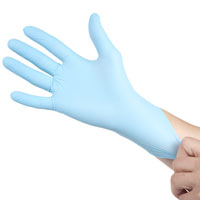How Glove Perforations Contaminate Surgical Instruments
October 19, 2018 When preparing for a surgical procedure, one of the most important steps that medical professionals must take is to ensure that the surgical instruments being used have been thoroughly cleaned and sterilized. However, many surgical instruments have sharp edges, blades, or points that can easily perforate a latex glove. As a result, the instrument can become contaminated by whatever germs may be on the person’s fingers or hands. A new study examines the incidence of glove perforation during high-risk orthopedic surgical procedures.
When preparing for a surgical procedure, one of the most important steps that medical professionals must take is to ensure that the surgical instruments being used have been thoroughly cleaned and sterilized. However, many surgical instruments have sharp edges, blades, or points that can easily perforate a latex glove. As a result, the instrument can become contaminated by whatever germs may be on the person’s fingers or hands. A new study examines the incidence of glove perforation during high-risk orthopedic surgical procedures.
The study was conducted by an attending orthopedic surgeon at the Children’s Hospital of Philadelphia. He decided to work on this project after noticing how often he would see nurses or new residents cleaning drill bits and other sharp instruments while wearing their gloves. He was concerned that there was a high risk of glove perforation. In addition, if the glove were to be punctured by a sharp drill bit, the hole would be difficult, if not impossible to see. The study was developed to quantify the risk of glove perforation.
Highlights from the Study
Four investigators performed six high-risk procedures in a simulated laboratory setting. For most of the procedures, alternative techniques were performed as well. The gloves were tested for holes or punctures using two standard methods of fluid leak testing. Researchers found the following results:
- Cleaning drill bits by hand had the highest tear rate of 85 percent.
- Catching a glove along the guide wire when passing a cannulated drill bit had a 50 percent perforation rate.
- Catching a glove around a rotating drill shaft had a perforation rate of 40 percent.
- Blind digital fracture reduction and directly visualizing the reduction had similar tear rates.
- Using fingers to insert screws while stabilizing threads resulted in a 15 percent perforation rate.
Unfortunately, team members are not typically given special instructions on how to clean things like drill bits. When bone debris gets into the bits, it is normal for nurses or residents to want to clean them out. However, too often, junior residents make the mistake of putting their fingers too close to a cannulated screw or a drill bit, and the glove can get caught. This is now approached as a common scenario and a teachable moment by instructing the resident to change gloves, as the instrument is likely contaminated, and to keep fingers away from pinch points.
Baltimore Medical Malpractice Lawyers at LeViness, Tolzman & Hamilton Protect Victims of Medical Errors
If you or a loved one has been injured or became ill due to a medical error, you are urged to contact the Baltimore medical malpractice lawyers at LeViness, Tolzman & Hamilton as soon as possible. Infections caused by contaminated surgical instruments can be avoided if the proper safety measures are followed. If your medical professional did not take the necessary precautions, we will hold that person liable for your injuries. Our experienced, dedicated team will seek the maximum financial compensation you deserve. To schedule a free, confidential consultation, call us today at 800-547-4LAW (4529) or contact us online.
Our offices are located in Baltimore, Columbia, Glen Burnie, and Towson, allowing us to represent medical malpractice victims in Maryland, including those in Anne Arundel County, Baltimore County, Carroll County, Harford County, Howard County, Montgomery County, Maryland’s Western Counties, Prince George’s County, Queen Anne’s County, Southern Maryland, and the Eastern Shore, as well as the communities of Catonsville, Essex, Halethorpe, Middle River, Rosedale, Gwynn Oak, Brooklandville, Dundalk, Pikesville, Nottingham, Windsor Mill, Lutherville, Timonium, Sparrows Point, Ridgewood, and Elkridge.






